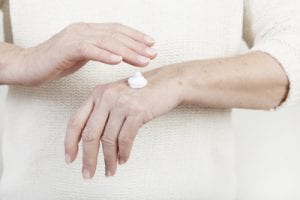Menopause is a time in a woman’s life when her menstrual cycle ends and she can no longer become pregnant. It is a normal change that all women will go through. Menopause usually occurs once a woman is in her 40s or 50s. However, some women may experience early menopause before they reach this age. This occurrence is also known as perimenopause. There are a few different signs of perimenopause, a few of which are the dryness of eyes, mouth, and/ or skin.
Why it Happens
When a woman is nearing menopause there are many hormonal changes occurring within her body. During this time, the ovaries stop releasing eggs, a woman’s period will come to an end, and the production of estrogen will decline. Estrogen does a lot for a woman’s body. It stimulates the maturation of a girl’s body during puberty, it keeps a woman’s bones strong, and it stimulates the production of collagen and oils that smooth the skin. Due to the reduction of estrogen, this is why skin may become dry and itchy. A decline in estrogen, along with other hormonal changes, can cause the skin to lose its ability to retain moisture. Research shows that these types of changes to the skin can occur early within menopause and that it may be permanent, but you can try treatments to help ease the pain.
Like dry skin, dry eyes are a common sign of early menopause due to the body’s decline in estrogen production. Dry eyes occur due to the hormonal changes that affect the ocular tissues and composition of tears.
Dry mouth can occur when there is not enough saliva in the mouth. This can make it difficult to eat and swallow. A lack of saliva, also known as the drying of the mucus membrane, may be due to a lack of estrogen within the body and hormonal changes. This may result in bad breath or a bitter taste in the mouth.
Treatment for Dry Eyes, Mouth, and Skin
There are several different natural treatments when it comes to combating dry eyes.
- Protecting your eyes. Wear sunglasses when outside that can wrap around the face and block the wind or air from getting in.
- Use a humidifier. Try to keep moisture within the air in your home or office.
- Avoid triggers. Try to avoid irritants like pollen and smoke.
- Avoid contact lenses. Contact lenses can make dry eyes worse. Try talking to your doctor if you need to wear contacts and are suffering from dry eyes.
A dry mouth may be managed or improved by making a few simple changes to your everyday life.
- Sugar-free Gum. Chew sugar-free chewing gum.
- Less caffeine. Decrease caffeine intake. Too much caffeine can dry out the body and make you thirstier.
- Drink more water. Drinking more water will help to increase hydration.
- Preventative products. Try products such as high fluoride toothpaste to help prevent dry mouth.
Research shows these five tips to help improve and combat dry skin.
- Wear sunscreen. Wearing sunscreen of SPF 15 or higher will help to keep your skin healthy.
- Stop steamy showers. Hot water can be very damaging and harmful to skin and actually dry it out. Even though hot showers might feel great, it may cause more harm than good to your skin.
- Moisturize, moisturize, moisturize. Do not forget to put on your favorite moisturizer within a few minutes of getting out of the shower. This will help to keep your skin hydrated.
- Eat smart fats. Foods filled with omega 3s help to produce the skin’s barrier oils to keep hydrated. Salmon, algae oils, eggs, and walnuts are filled with omega 3s.
Overview
Early menopause and menopause can cause a lot of changes throughout the female body. It is important to pay attention to your body during this time period. If you are suffering from signs of early menopause you may wish to try some of the suggested treatments to help ease the discomfort of these symptoms.






